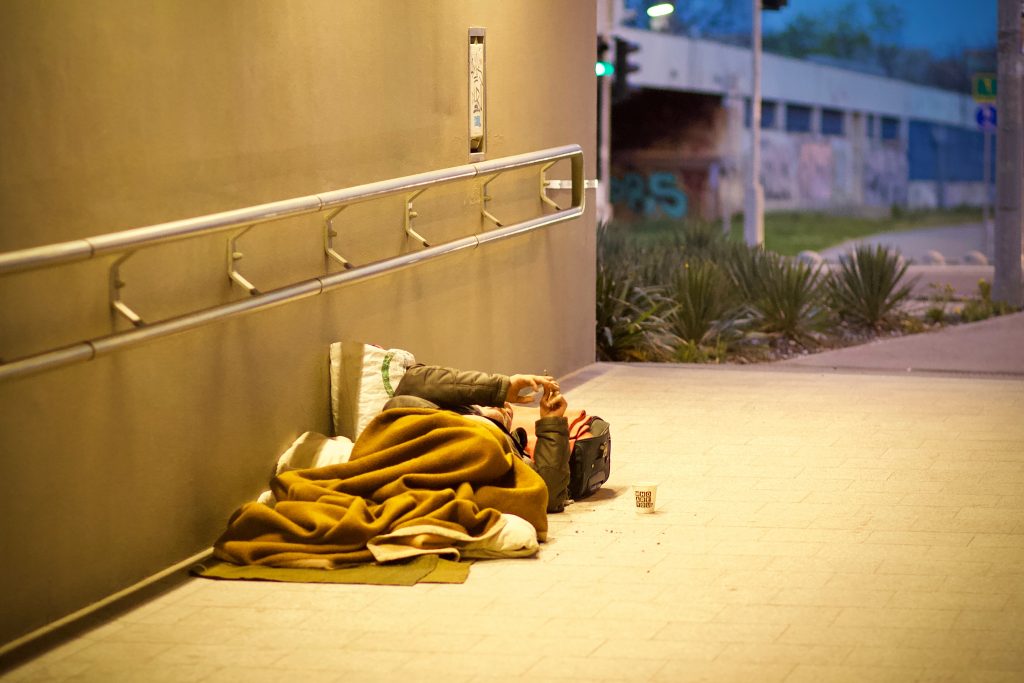Our response to homelessness needs to extend beyond public services to include businesses and the general public, writes Tamsin Sterling.
This is the third article curated by Community Housing Cymru in a series exploring homelessness in Wales as a cross sector issue. You can read the first article here and the second article here.
In recent months, Julie James, the Minister for Housing and Local Government has referred to homelessness as a public services issue and stated that ‘we need a whole system approach to tackling homelessness in all its forms’. I totally agree but would argue that this whole system approach needs to extend beyond public services, (however broadly defined), to include businesses and the general public.
In the past it has sometimes felt that homelessness is not necessarily even seen as the business of all those who work in housing, let alone other areas of public services or private businesses. And while many individuals are very concerned about homelessness, harnessing their goodwill in ways that support what actually works to end homelessness can be a challenge. Calls for ‘something to be done now’ can result in responses that are not evidence-based or effective.
Members of the public can also be forgiven for being confused by the mixed messages that are given out by different organisations working in the sector. And the way that homelessness is portrayed in the media can be problematic, emphasising individual over structural issues, focusing on street homelessness and talking little about solutions.
Many businesses are also concerned about homelessness but, over recent months, just in South Wales, we have seen responses that range from informed and helpful, to outright hostility towards people who are living on the streets.
So what can we do to change this? As part of its work, the Homelessness Action Group is looking at culture and perceptions around homelessness and will be putting forward a number of suggestions about practical steps that we can collectively take to help make homelessness everybody’s business.
We have a really good example to draw on; the Play your Part campaign for the Homeless World Cup last summer set out ways in which different types of organisation and the general public can play their part in ending homelessness. One of the recommendations of the Homelessness Action Group’s first report on rough sleeping is for a public awareness campaign that builds on the Play your Part campaign. I recently heard of someone who carries the five ‘asks of the people of Wales’ from the campaign with them to remind themselves of what they can do.
I have some personal reflections on broader engagement in homelessness from a travel fellowship I was lucky to secure a while ago. I looked at a number of international examples of how communities and businesses were engaged in youth homelessness. The main learning points from these examples are equally relevant to homelessness across the board.
I found that engaging businesses and communities effectively in the endeavour of ending youth homelessness requires a clarity of purpose based on a long-term vision, while ensuring that shorter-term interventions and projects move things towards the long-term vision rather than being a sticking plaster for current crises.
We also need to see transparency and accountability in leadership around engagement, whether this is in relation to an alliance, coalition or individual organisation, with better communication to support greater understanding of the reasons for young people becoming homeless and what actually works to prevent and respond to youth homelessness. Providing businesses, communities and individuals with a range of options for engagement.
While on the travel fellowship, I came across some great examples which included:
- Ballots of the public and training of community advocates for social and supported housing in Los Angeles
- Mobilising community capacity around a strategy to end youth homelessness in Kamloops, British Columbia
- Annual events in Edmonton, Alberta enabling access for young people who are or have been homeless to a range of services provided by businesses on a pro-bono basis
- Sophisticated, long-term partnerships with business, the most significant of these being between A Way Home Canada and the Home Depot Canada Foundation
With the political leadership being shown by Julie James on the commitment to end homelessness in Wales has come a sharper focus on what different organisations might do to help end homelessness. We need to be able to clearly articulate what roles businesses, communities and individuals can play and think through how we can encourage them to take action. And this needs to be done in a co-ordinated way, reflecting the whole system approach that the Minister wants to see.
Photo by Mihály Köles on Unsplash
All articles published on Click on Wales are subject to IWA’s disclaimer.





